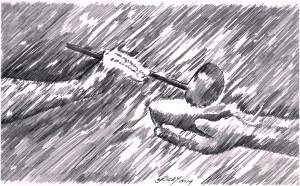Mercy
An underused word in our modern society, it seems to have fallen out of fashion except, perhaps, in religious settings. We rarely hear it spoken, even in fiction. Perhaps that’s why the appeal of Les Miserables persists – the premise of mercy on which the story stands is irresistible.
The Macquarie Dictionary defines mercy as:
compassionate or kindly forbearance shown towards an offender, an enemy, or other person in one’s power; compassion, pity, or benevolence
Synonyms include:

- compassion
- pity
- kindness
- forgiveness
Mercy, thus defined, is something given in a situation of inequality by the one with the greater power. Inspector Jaevert had it in his power to treat Valjean as an equal, especially once he had served his time, but he declined to do so.
This idea of unequal power is a central concept to understanding what mercy means. How we behave towards someone over whom we have a vestige of power is a sure way of identifying what, if anything, we know about mercy.
Because we don’t have to look very far to see the misuse and abuse of power, we may wonder if there is any mercy in our society today. It’s my premise that mercy is to be found, but because we don’t always find it in the places we think it should be, we don’t always see it, or if we do, we fail to name it.